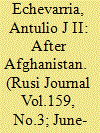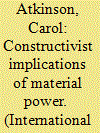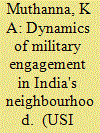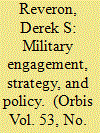| Srl | Item |
| 1 |
ID:
132085


|
|
|
|
|
| Publication |
2014.
|
| Summary/Abstract |
One of the key issues to be discussed at the forthcoming NATO summit will be preparation for future military engagements after more than a decade of counter-insurgency operations in Afghanistan. Antulio J Echevarria II revisits some of the key lessons to be drawn from this experience, and highlights the questions that will need to be addressed if the Alliance is to be equipped to meet future challenges in a changing world.
|
|
|
|
|
|
|
|
|
|
|
|
|
|
|
|
| 2 |
ID:
073546


|
|
|
|
|
| Publication |
2006.
|
| Summary/Abstract |
The research presented in this article examines one aspect of state socialization, the extent to which transnational military-to-military interactions have served as an effective mechanism of the democratic political socialization of states. Military organizations are very interesting when we consider avenues by which state socialization might occur because military organizations are an influential part of governments, and members share common beliefs and values as soldiers and officers that transcend borders. Thus, it would seem that a state's military structure is one likely channel whereby politically relevant individuals might learn new ideas and have the capability to reform existing institutional structures. The socialization process described in this study is three level: (1) individuals acquire new ideas; (2) coercion, incentives, and persuasion aid in institutionalizing these ideas in the underlying political structure of the state; and (3) once institutionalized, these new ideas/identity of the state influence the material and ideational structure of international society. Using Cox Proportional Hazard models and an original data set encompassing over 160 states during the years 1972-2000, the analyses find U.S. military-to-military contacts to be positively and systematically associated with liberalizing trends. This finding provides evidence that constructivist mechanisms do have observable effects, and that ideationally based processes play an important role in U.S. national security.
|
|
|
|
|
|
|
|
|
|
|
|
|
|
|
|
| 3 |
ID:
076374


|
|
|
| 4 |
ID:
100969


|
|
|
|
|
| Publication |
2010.
|
| Summary/Abstract |
Defence cooperation and military engagement between India and China are aspects of the complex mix of conflict and cooperation approach to bilateral relations between the two Asian giants. It is based on the presumption that there is a security dilemma between the two countries. However, it recognises the framework and postulates of what is called cooperative security. Through the liberal institutionalist's perspective, it argues that India-China defence cooperation and military engagement are not only possible but also desirable. For these two biggest developing nations of the world, peace and friendship between them are not only in their mutual interests, but also important for bringing peace, stability and prosperity to South Asia.
|
|
|
|
|
|
|
|
|
|
|
|
|
|
|
|
| 5 |
ID:
181660


|
|
|
|
|
| Summary/Abstract |
This article introduces supervised machine learning to the study of German strategic culture, analyzing both how German strategic culture has changed and the impact of strategic culture on Germany's military engagement between 1990 and 2017. In contrast with previous qualitative research on strategic culture, supervised machine learning can yield measurable and empirical insights into strategic culture and its effects at any given point in time over a very long period, based on the reproduction of human coding of a very extensive set of security policy documents. The article shows that German strategic culture has changed slowly and in a nonlinear way after the Cold War, and that strategic culture, when controlling for confounding variables and the temporal order, has a measurable impact on Germany's military engagement. The article demonstrates the analytical value of machine learning for future studies of strategic culture.
|
|
|
|
|
|
|
|
|
|
|
|
|
|
|
|
| 6 |
ID:
089721


|
|
|
| 7 |
ID:
086505


|
|
|
|
|
| Publication |
2009.
|
| Summary/Abstract |
In Germany, "national interest" is no longer a taboo reason for involvement in military engagements abroad. This gives the debate around humanitarian interventions a new logic. Germany-and the United States too-would do well to think twice about the responsibilities and resources that their interventions abroad ultimately entail.
|
|
|
|
|
|
|
|
|
|
|
|
|
|
|
|